Listed below are selected teacher resources and non-fiction related to drama, as well as some plays, monologues, and scripts which can be used in the classroom.
Teacher Resources
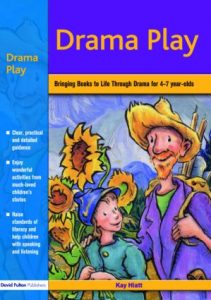 Drama play: Bringing books to life through drama in the early years
Drama play: Bringing books to life through drama in the early years
by Kay Hiatt
Grades: K-2
This book shows how to use stories in combination with basic drama techniques to raise standards in reading, writing, speaking and listening. Provides clear and easy-to-use activities that will enhance understanding of basic drama techniques for teachers and children; includes a checklist to help senior managers assess the whole-school impact of these activities; and offers templates for easy planning. eBook
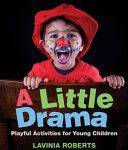 A little drama! Playful activities for young children
A little drama! Playful activities for young children
by Lavinia Roberts
Grades: K-3. This book includes more than 200 theatre and drama activities for promoting young children’s social-emotional learning.
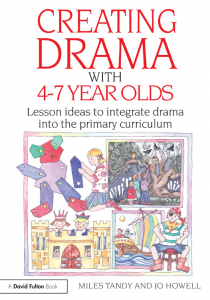 Creating drama with 4-7 year olds: Lessons to integrate drama into the primary curriculum
Creating drama with 4-7 year olds: Lessons to integrate drama into the primary curriculum
by Miles Tandy and Jo Howell
Grades: K-3
The authors present ideas on how to make drama a regular and integral part of the school curriculum, offering detailed suggestions of drama work for ages four to seven. The teaching units are arranged around four strands: drama for literacy; drama and the whole curriculum; drama film, media, and ICT; and drama for performance. eBook
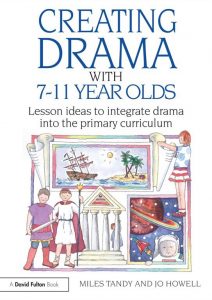 Creating drama with 7-11 year olds: Lessons to integrate drama into the primary curriculum
Creating drama with 7-11 year olds: Lessons to integrate drama into the primary curriculum
by Miles Tandy and Jo Howell
Grades: 2-6
The authors present ideas on how to make drama a regular and integral part of the school curriculum, offering detailed suggestions of drama work for ages seven to eleven. The teaching units are arranged around four strands: drama for literacy; drama and the whole curriculum; drama film, media, and ICT; and drama for performance. eBook
by Larry Swartz and Debbie Nyman
Grades: 6-12
Offers a comprehensive outline of improvisation and interpretation strategies that teachers can incorporate in classroom instruction. Organized around universal themes that invite students to make connections to texts and to each other, the book encourages students to consider their own identities and their place in the world. Also available as an eBook.
by Michael Fleming
Grades: 6-12
Provides ready-to-use material for drama teachers and highlights how dramatic techniques can be used to inform classroom teaching and develop teacher practice. Includes detailed discussion of twenty-five drama techniques including, monologue and narration, mime, irony, beginnings and endings, minor characters, and more. eBook
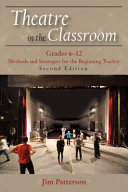 Theatre in the classroom, grades 6-12: Methods and strategies for the beginning teacher
Theatre in the classroom, grades 6-12: Methods and strategies for the beginning teacher
by Jim Patterson
Grades: 6-12
Equips prospective theatre teachers with key instructional methods and proven strategies for student learning. Includes chapters on planning, managing the classroom, assessment, cross-curricular teaching, and more.
by Johnnie Young
Grades: 6-12
Contains 100 tried and tested inspirational ideas on teaching drama in the classroom. Ideas range from developing pupils’ story telling to bringing literature alive.
 Improvisation starters: more than 1,000 improvisation scenarios for the theater and classroom
Improvisation starters: more than 1,000 improvisation scenarios for the theater and classroom
by Philip Bernardi
Grades: K-12, Adult
Improvisation is an essential and invaluable technique for the actor’s repertoire: It asks you to think beyond a script–and its memorized lines, movements, and facial expressions–to deliver a performance filled with honesty, insight, nuance, and verisimilitude. This book provides more than 1,000 scene scenarios.
Non-Fiction
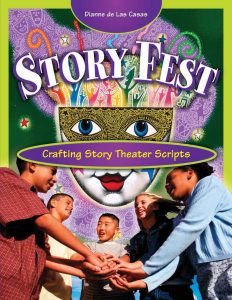 Story fest: Crafting story theater scripts
Story fest: Crafting story theater scripts
written by Dianne de las Casas, illustrated by Jeanne de la Houssaye.
Grades: 2-6
Contains 25 story theater scripts which are designed to accommodate whole-classroom participation. The book also includes a description of the process for working with students to create a school Story Fest.
by Megan Kopp
Grades: 3-6
A drama is a story that is experienced by an audience as a performance. Readers will explore acts, dialogue, stage direction, and other elements that define this genre. Mentor texts and writing prompts guide readers as they compose their own dramas. Part of the Text styles series.
Plays, Monologues, and Scripts
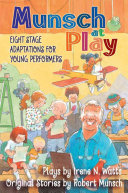 Munsch at play: Eight stage adaptations for young performers
Munsch at play: Eight stage adaptations for young performers
plays by Irene N. Watts, original stories by Robert Munsch
Grades: 1-4
Eight of Robert Munsch’s stories have been adapted for performance by young people, including Below Zero; Mud Puddle; Paper Bag Princess, and more. Each story is presented in typical play format, preceded by cast listings and useful suggestions for staging, set design, and props and costumes. Illustrations from the original books enliven the pages. See also, Munsch at play act 2: Eight more stage adaptions.
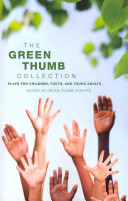 The Green Thumb collection: Plays for children, youth, and young adults,
The Green Thumb collection: Plays for children, youth, and young adults,
edited by Green Thumb Theatre
Grades: 2-12
A collection of six plays written specifically for children, youth, and young adults. Plays in the collection touch on themes of environmental concerns, self-esteem, addiction, and more.
by Mary Hall Surface
Grades: 6-9
A collection of original scenes and monologues written especially for middle-school actors. Includes emotional monologues, two- and four- actor scenes with strong relationships, and multiple-actor scenes with equally weighted parts.
Finding More Resources
To find more resources in this area, try the following:
- Search using the General tab on the UBC Library website to look for material in all UBC Library branches.
- Search using “Search Education Resources” box in the left hand bar on the Education Library website to limit your results to materials in the Education Library.
- Use specific search terms to narrow your results, such as “Drama–Study and teaching (Primary)”, “Drama–Study and teaching (Secondary)”, “Drama in education”, “Theater-Study and teaching (Elementary)”, “Theater–Study and teaching (Secondary)”, “Children’s plays”.
- To find lesson plans, include “lesson plans”, “lesson planning”, or “activity programs” in your search terms.
For more help with searching, please visit the Library Service Desk or e-mail ed.lib@ubc.ca.
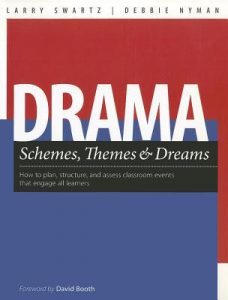 Drama schemes, themes & dreams: How to plan, structure, and assess classroom events that engage all learners
Drama schemes, themes & dreams: How to plan, structure, and assess classroom events that engage all learners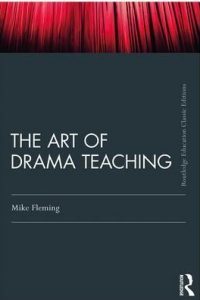 The art of drama teaching
The art of drama teaching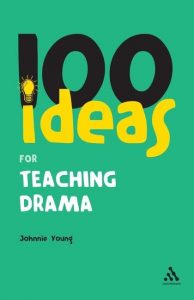
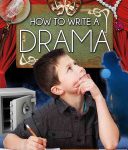
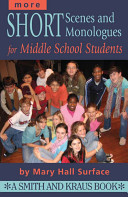 More short scenes and monologues for middle school students: Inspired by literature, social studies, and real life
More short scenes and monologues for middle school students: Inspired by literature, social studies, and real life